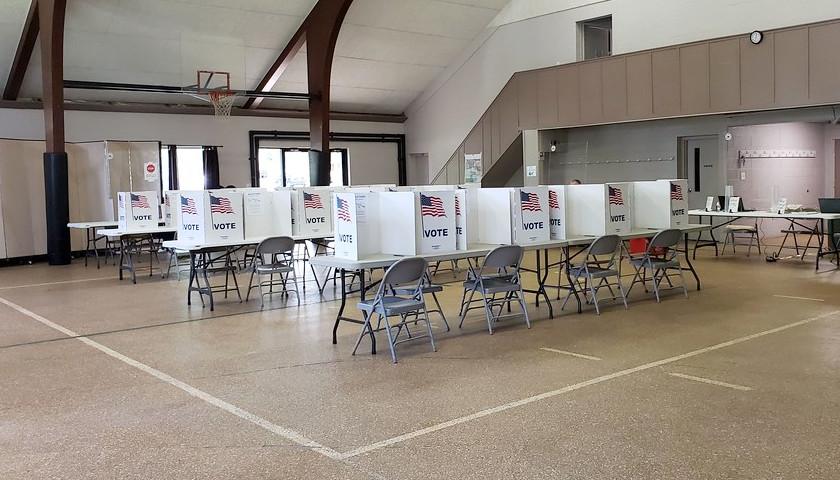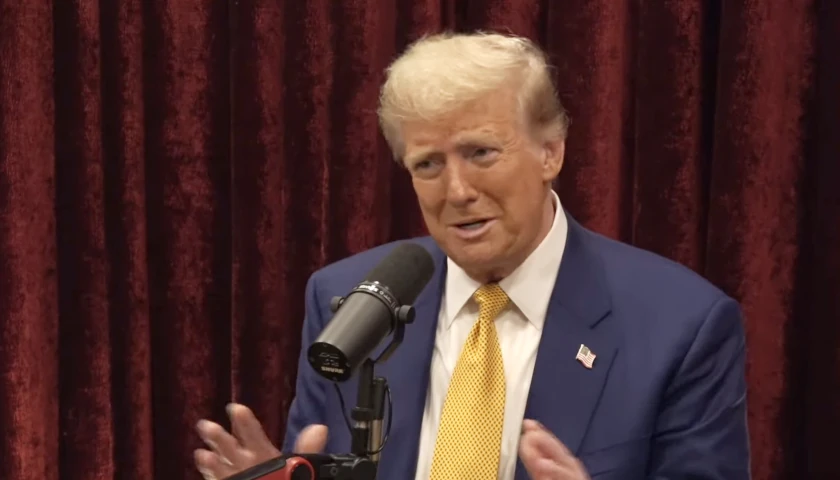by Natalia Mittelstadt
The U.S. Justice Department sued two rural Wisconsin towns after they switched from including electronic voting machines to using only paper ballots in their elections and counting them by hand.
The Biden DOJ alleged that the towns and state violated Section 301 of the Help America Vote Act of 2002 (HAVA) by not having an accessible voting machine for voters with disabilities.
One town, Lawrence, with a population 301 people, settled, signing a consent decree with the DOJ last Friday. In accordance with the consent decree, the town board voted on Sept. 6 to rescind the January 2023 decision to not turn “on the voting machine.”
Lawrence town officials are “required to ensure that Lawrence’s voting systems are accessible for individuals with disabilities by using at least one direct recording electronic voting system or other voting system equipped for individuals with disabilities at each polling place in the State, for each election for federal office, as required by Section 301 of HAVA,” according to the settlement.
The order is to take effect upon court approval and will expire on December 31, 2028, unless it is extended.
While Lawrence settled with the DOJ, the town of Thornapple is defending its decision, saying that it is following the law by ensuring that voters with disabilities are in fact receiving the required assistance. According to the DOJ’s lawsuit, the Thornapple Town Board of Supervisors voted in June 2023 to “stop use of the electronic voting machine and use paper ballots.”
Thornapple had previously used Dominion Voting Systems’ ImageCast Evolution machine to mark and count votes before the decision to maintain the paper ballot requirement.
The town used only paper ballots this year in both the April presidential preference primary election and the August federal primary election at Thornapple’s sole polling place.
The DOJ asked the court to declare that the defendants “have failed to ensure that the State’s voting systems are accessible for individuals with disabilities by using at least one direct recording electronic voting system or other voting system equipped for individuals with disabilities at each polling place, in violation of Section 301 of the Help America Vote Act”; to enjoin the defendants “from failing to ensure that a voting system equipped for individuals with disabilities is present at each polling place in the State, as required by Section 301 of HAVA”; and direct the defendants “to take appropriate action to ensure uniform compliance with this Court’s order by all entities administering the State’s electoral processes.”
Because Lawrence reached a settlement with the DOJ last Friday, Thornapple is the sole remaining defendant.
“Our democracy works when voters with disabilities have the right to vote on the same terms as any other voter,” DOJ’s Assistant Attorney General Kristen Clarke said in a statement Friday. “By failing to offer accessible voting systems, Thornapple and Lawrence shirked their responsibilities under the Help America Vote Act to provide equal access to the ballot for all voters.
“We must ensure that all Wisconsin towns, and indeed all jurisdictions throughout our country, fulfill their duty to guarantee all voters equal access to the ballot. We commend Lawrence for working with the Justice Department to swiftly remedy this violation by taking simple action to ensure that federal elections are accessible to all eligible voters.”
“Ensuring equal voting access to all citizens, including those voters with disabilities, is a priority of this office,” U.S. Attorney Timothy M. O’Shea for the Western District of Wisconsin said in a statement. “We’re pleased that the representatives of the Town of Lawrence agreed to remedy the violations of federal law, and we will continue to work to protect and vindicate the voting rights of voters with disabilities in Wisconsin.”
The America First Policy Institute (AFPI) is representing the Thornapple defendants in the case.
AFPI filed a motion to dismiss on Wednesday, arguing that because HAVA requirements apply to a “voting system” that’s “mechanical, electromechanical, or electronic,” they do not apply to Thornapple, which uses paper ballots and conducts the election by hand.
Also, “the Town’s process is both envisioned by and consistent with Wisconsin’s laws ensuring that individuals with disabilities can exercise their right to vote,” the defendants argue. “As to the machines themselves, Wisconsin only requires their use by municipalities with a population equal to or greater than 7,500,” explains the motion to dismiss. Thornapple’s population of 721 people falls far below that threshold.
Michael Berry, executive director of AFPI’s Center for Litigation, told Just the News on Thursday that the DOJ should prioritize ongoing election integrity issues in larger cities, rather than paper ballot elections.
“It’s appalling that the Department of Justice is bullying and targeting a small town in rural Wisconsin over its decision to use hand-counted paper ballots,” Berry said. “I would think the United States Department of Justice has much better things to do with its time and resources, including fixing the rampant election integrity problems in many of our large cities. AFPI is proud to represent Thornapple, Wisconsin, as it stands up to the Goliath that is the Department of Justice.”
Two other complaints have also been filed with the Wisconsin Elections Commission (WEC) regarding Thornapple’s move to paper-only ballots, Wisconsin Public Radio reported.
One was filed in late August by self-described “progressive” firm Law Forward on behalf of Rusk County Democratic Party Chair Erin Webster, claiming that municipalities that initially used voting machines must receive permission to cease using them. Law Forward co-founder Jeff Mandell told WPR that as far as he knows, “the town of Thornapple did not ask or receive permission.”
The second complaint filed to the WEC was from Disability Rights Wisconsin in late August, seeking to bring back an accessible voting machine for the November election in both Thornapple and Lawrence.
A Thornapple town official didn’t immediately respond to a request for comment Thursday. A Lawrence town official declined to comment on Thursday since the matter is resolved.
– – –
Natalia Mittelstadt is a reporter at Just the News.
Photo “Election Day” by Corey Seeman CCNC2.0




